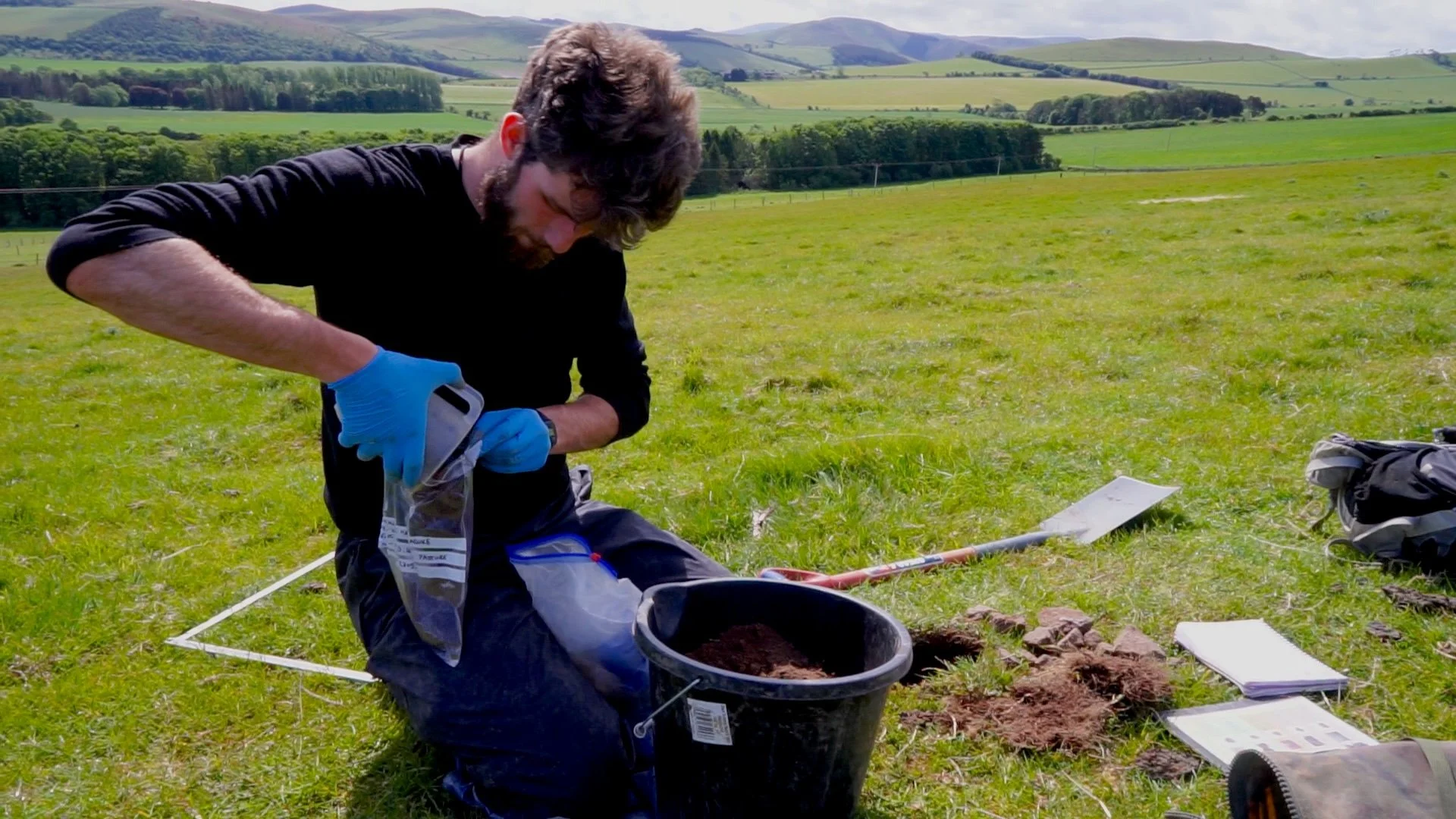Working alongside University of Oxford to study earthworms in regenerative farming
Regenerate Outcomes is working alongside the University of Oxford to support a study to identify the effects of adaptive multi-paddock grazing (AMP) on soil biodiversity.
PhD student Max Hadoke has taken samples from plots on 12 farms which are part of Regenerate Outcomes to compare earthworm populations in set-stocked and AMP grazed fields.
His studies are being funded through the Natural Environment Research Council by a doctoral training partnership in Oxford.
Regenerate Outcomes have committed three years of funding as his Collaborative Award in Science and Engineering partner, with our Chief Scientific Officer Dr Matt Jordon acting as co-supervisor to the project.
Earthworms as ecosystem engineers
“I am studying the effects of different grazing management methods on soil biodiversity, specifically earthworms,” says Max.
“The key component of the comparison is between fields which are set-stocked and those which are managed more regeneratively, specifically with adaptive multi-paddock grazing.
“We’re trying to see if there's an effect from the above ground management on the below ground soil communities.
“I am focusing on earthworms because they are so important biologically. They are ecosystem engineers and they help with nutrient cycling and water infiltration. There’s also some evidence that they help with primary productivity as they break down nutrients which then supply plants.”
Max at work on a farm in Northumberland
Alongside earthworms, Max will also record other organisms such as fly and beetle larvae within each plot.
He will analyse the different species of earthworm, as well as the demographic - the number of juveniles and adults - and the function they are fulfilling in the soil.
“There are three key groups of earthworms that have different functions; epigeic, endogeic and anecic,” says Max.
“If there are any differences in species, demographics or functions it can give an indication as to whether the management is providing additional benefits such as nutrient cycling and water filtration.”
Know your earthworms
There are three main types of earthworm.
Epigeic earthworms live among decaying organic matter on the soil surface. They eat leaf litter, plant matter and dung. They quickly consume and excrete compostable material.
Endogeic earthworms live in horizontal burrows in the top layer of soil and rarely come to the surface. They eat soil and play an important part in combining it with minerals and air.
Anecic earthworms live up to six feet below the soil surface in vertical burrows, but come to the surface to collect organic matter before dragging it back down below.
Adding to the data on regenerative farming
One of the biggest challenges of the study is making clear comparisons on ground which may have been managed variably over many years, with different soil types - even within single fields.
Accordingly, the study has been carefully designed to make comparisons as clear as possible, taking into account historical management such as drilling, silage-cutting and grazing.
“If there are any differences in species, demographics or functions it can give an indication as to whether the management is providing additional benefits.”
“Farming by its nature has to be quite dynamic,” says Max.
“The way people AMP graze varies hugely and may still include periods of set-stocking, while some farmers may rotate within a set-stocked system more regularly than others.”
Next year Max would like to continue the study by looking at root biomass and plant diversity, with final data collection and analysis completed in 2027.
Monitoring biodiversity benefits
“We are building a compelling evidence base on the soil carbon sequestration benefits of adaptive multi-paddock grazing compared to set-stocking,” says Dr Matt Jordon, Chief Scientific Officer for Regenerate Outcomes, who is also Max’s co-supervisor on the project.
“However, we also know that the benefits of improved grazing management are not just carbon related.
“Max’s PhD is providing an important step towards building a UK-specific evidence base on the wider benefits of adaptive multi-paddock grazing, and improving soil health more generally, on key biodiversity indicators and functional groups.”
“We are building a compelling evidence base on the soil carbon sequestration benefits of adaptive multi-paddock grazing compared to set-stocking.”
Regenerate Outcomes intends to continue academic partnerships over the coming years to look at other biodiversity indicators such as songbirds, aboveground invertebrates and plant diversity, across both grazing and cropping systems.
“Ultimately, carbon credit buyers are looking for additional impact beyond verified carbon outcomes, and projects like Max’s enable us to demonstrate the biodiversity co-benefits being achieved on our members’ farms through independent, rigorous, peer-reviewed academic research,” says Matt.
Regenerate Outcomes works with
farmers to grow profits
We provide one-to-one mentoring to help you cut costs and improve crop and livestock performance.
At the same time, we baseline and measure soil carbon at no upfront cost to generate carbon credits which you can retain or sell for additional income.
Find out more by downloading our Programme Handbook.



